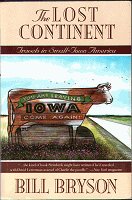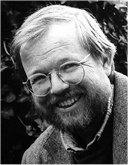
 THE LOST CONTINENT by Bill Bryson (hier online bestellen)
THE LOST CONTINENT by Bill Bryson (hier online bestellen)
The story:
After spending 20 years in England (see Notes from a Small Island), Bill Bryson returns to his
home town of Des Moines in Iowa (I come from Des Moines. Somebody had to). Obviously feeling the need and the
urge to get acquainted with his home country, he goes on a tour of the USA in two instalments. In the first
which takes place in the fall of 1987 he travels most of the Eastern states and in the second he resumes the trip in the spring of
1988 and covers most of the West.
He relates in his typically humorous and ironic way what he experiences on his trip, which his old Chevy Chevette
takes him to 38 states. He revisits places like Mackinac Island in Lake Huron, the Rocky Mts or
Gettysburg where his father took him when he was a child.
Now he also travels to places where ordinary tourists would also go like the Smoky Mts, the Gran Canyon or the Yellowstone Park.
But the more ineresting places he visits are those in remote places where ordinary people would necessarily not go.
So he makes long detours to get eg. to the Geographical Center of the USA which is in Northern
Kansas or to Holcomb, also a little town in Kansas which Truman Capote chose as the setting for
his book In Cold Blood. There two crooks ruthlessly killed a wealthy rancher, his wife and their two teenaged
children. Strangely enough, when Bryson addresses people there pertaining to that incident, nobody seems to know anything about it.
In Idaho he visits a place called Acorn, a town where American for the first time used nuclear energy in 1951 to
generate electricity. Only recently the US government admitted that the most lethal substance, Plutonium, had
been found to be leaking there to subterranean reservoirs.
In South Dakota he has a look at the strangely shaped Devils Tower, the mountain which Steven Spielberg used in his
Close Encounters of the Third Kind.
In Tennessee Bryson visits Columbus, Tennessee Williams' hometown. In Missouri he goes to Hannibal where there is Mark
Twain's boyhood home or in Mississippi he travels to Rowan Oak, William Faulkner's home.
On long and boring stretches of countryside, esp. in Nebraska or Nevada, Bryson has time to ponder about his country and
society in quite a critical way. So he makes fun of the large number of overweighed people, he criticizes Americans'
careless behaviour with their environment (see above Acorn/nuclear waste), the high crime rate in connection with the
almost unlimited use of guns, the mass tourism esp. in National Parks (motorhome cult) or those
typically American women wearing butterfly glasses and a beehive hairdo.
If you really like good humour or even plan to travel to America yourself, this is the book to read.
About the author:
 Bill Bryson was born in Des Moines, Iowa, in 1951. A backpacking expedition in 1973 brought him to England
where he met his wife and decided to stay. He wrote for the English newspapers
for many years, writing travel articles to enhance his income. He lived with his family in North Yorkshire
before moving back to the States in 1995. He now lives in Hanover, New Hampshire, with his wife and four
children.
Bill Bryson was born in Des Moines, Iowa, in 1951. A backpacking expedition in 1973 brought him to England
where he met his wife and decided to stay. He wrote for the English newspapers
for many years, writing travel articles to enhance his income. He lived with his family in North Yorkshire
before moving back to the States in 1995. He now lives in Hanover, New Hampshire, with his wife and four
children.
The Lost Continent, Bill Bryson's hilarious first travel book, describes a trip in his mother's Chevy around
small town America. Since then, he has written several more about the UK and the US, including
bestsellers, A Walk in the Woods, I'm A Stranger Here Myself (published in Britain as Notes from a Big Country),
and In a Sunburned Country (published in Britain as Down Under).
His other books include Bill Bryson's Dictionary of Troublesome Words, Neither Here nor There: Travels in
Europe, Made in America, The Mother Tongue and Bill Bryson's African Diary. His latest book,
A Short History of Nearly Everything, is available now.
Extract from book:
Bryson on small towns typical of the Midwest:
.....
Small towns are equally unhelpful in offering distinguishing features. All that separates them are their names.
They always have a gas station, a grocery store, a grain elevator, a place selling farm equipment and fertilizers,
and something improbable like a microwave oven dealer or a dry cleaner's, so you can say to yourself, as you glide
through town, "Now what would they be doing with a dry cleaner's in Fungus City?" Every fourth or fifth community
will be a country town, built around a square. A handsome brick courthouse with a Civil War cannon and a monument to the dead
of at least two wars will stand on one side of the square, and on the other sides will be businesses: a five-and-dime,
a luncheonette, two banks, a hardware store, a Christian bookstore, a barber's, a couple of hairdressers, a place
selling the sort of men's clothing taht only someone from a very small twon would wear. At least two of the businesses
will be called Vern's. The centarl area of the square will be a park, with fat trees and a bandstand and a pole with an
American flag and scattered benches full of old men in John Deere caps sitting around talking about the days when they
had something else to do other than sit around and talk about the days when they had something else to do.
Time in these places creaks along.
.....
Buchdaten:
The Lost Continent
Sprache: Englisch
Taschenbuch - 320 Seiten - Perennial
Erscheinungsdatum: Mai 2001
ISBN: 0060920084
Preis: € 13,50
More works from the same author:
zurück zur Übersicht
|
 THE LOST CONTINENT by Bill Bryson (hier online bestellen)
THE LOST CONTINENT by Bill Bryson (hier online bestellen)
 Bill Bryson was born in Des Moines, Iowa, in 1951. A backpacking expedition in 1973 brought him to England
where he met his wife and decided to stay. He wrote for the English newspapers
for many years, writing travel articles to enhance his income. He lived with his family in North Yorkshire
before moving back to the States in 1995. He now lives in Hanover, New Hampshire, with his wife and four
children.
Bill Bryson was born in Des Moines, Iowa, in 1951. A backpacking expedition in 1973 brought him to England
where he met his wife and decided to stay. He wrote for the English newspapers
for many years, writing travel articles to enhance his income. He lived with his family in North Yorkshire
before moving back to the States in 1995. He now lives in Hanover, New Hampshire, with his wife and four
children.



